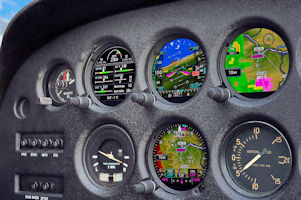
TL;DAR:
God reassured Joshua that He would always be with him, urging him to be strong, courageous, and obedient to His Word. Just as a pilot must trust flight instruments rather than unreliable feelings, believers must depend on God’s guidance instead of personal instincts. Like Joshua, we are called to obey faithfully and trust that God will direct our path, even when visibility is limited.

1 5 "No one will be able to stand against you all the days of your life. As I was with Moses, so I will be with you; I will never leave you nor forsake you. 6 Be strong and courageous, because you will lead these people to inherit the land I swore to their ancestors to give them.
7 "Be strong and very courageous. Be careful to obey all the law my servant Moses gave you; do not turn from it to the right or to the left, that you may be successful wherever you go. 8 Keep this Book of the Law always on your lips; meditate on it day and night so that you may be careful to do everything written in it. Then, you will be prosperous and successful. 9 Have I not commanded you? Be strong and courageous. Do not be afraid; do not be discouraged, for the Lord your God will be with you wherever you go."
As part of my private pilot's license training, I had to do some "blind" flying: maneuvers aloft using only the instrument panel for guidance without looking out the aircraft's windows.
The first time I was preparing to take off with my instructor to do some instrument flying, he warned me not to rely on my physical sensations aboard the aircraft. The instruments -- artificial horizon, turn and bank indicator, altimeter, tachometer, airspeed indicator, gyroscopic compass, and radio beam receivers -- were reliable. They could be trusted. But, he said, my physical sensations during the time I was flying "blind" could not be trusted.
After we took off from Wiley Post Airport in Bethany, OK, the instructor had me put on a special hood. For the next half hour or so, that hood restricted my vision to the instrument panel. I immediately began to understand what my instructor had warned me about. The plane's vibrations, the engine noise, and the unevenness of the outside air all combined to tell my senses that the little Cessna 150 was doing things that the instruments denied were happening.
For that half-hour or so, I had to force myself to trust those instruments. Even then, my physical instincts would sometimes temporarily catch me off guard. It was reassuring to take that hood off and fly that plane with an eye on the horizon and the ground below.
Instrument flying is an art. It takes intense concentration and complete trust in that panel of instruments. Unfortunately, pilots are like most human beings: inclined to trust themselves first of all. There are stories of inexperienced pilots who unexpectedly found themselves in dense clouds and forced to fly solely by their instruments. They began to trust their physical sensations more than those instruments, and they came out of the clouds upside down, all the while convinced that they were right side up until they saw the ground.
Long before the Wright brothers put their flimsy contraption atop a hill at Kitty Hawk, the Lord cautioned a man named Joshua to combine an intense concentration on his "instrument panel" with complete trust in those "instruments."
Moses died on the brink of Israel's scheduled "flight" into the Promised Land, and Joshua was handed the controls of the "plane."
In the first chapter of the book bearing his name, Joshua records the preflight instructions he received from the Lord. The Lord challenged him not to trust his own sensations but to intently observe the instrument panel he'd been given and to respond without hesitation to the indications of the divine compass.
Ahead of Joshua lay a monumental task. He didn't know what he would encounter, and he didn't need to know. The Lord had assembled an adequate panel of indicators to guide the flight for which Joshua was to be the "pilot.". The Lord said these indicators could and should be trusted without misgivings.
Even today, the Lord is a giver of generous promises, as He was to Joshua. For us to fully enjoy His promises, God asks that we trust and follow the navigation instruments He has given us.
Have you been guilty of coming out of the clouds upside down? Following your own impressions and sensations could lead you to a meeting with a canyon wall rather than to the safe landing we've been promised. The instrument panel is there. Let's trust it!
-- Howard Culbertson, hculbert@snu.edu
I wrote this devotional blog post while Barbara and I were serving as missionaries in Italy. It originally appeared in Standard, a weekly Faith Connections take-home curriculum piece for adult Sunday school class published by The Foundry.
Trusting in God's guidance demonstrates our belief that there is divine wisdom beyond our understanding. Trusting God is an act of embracing faith and acknowledging that, surrounded by life's uncertainties, we need His steadfast presence to guide us. Whether we are experiencing moments of joy or facing trials, trusting in God's guidance will provide us with the strength we need. Trust also provides resilience in times of adversity. While the road ahead may be winding and challenging, God's guidance can show the way.